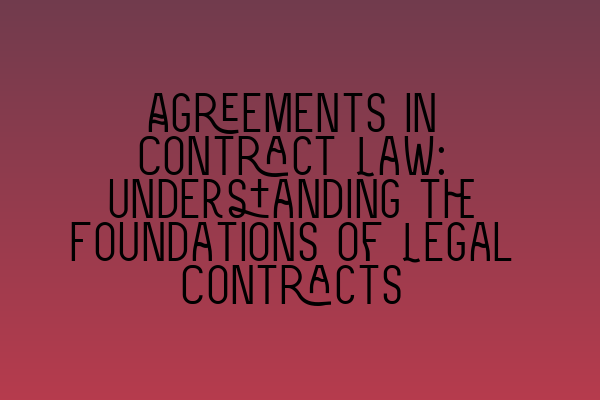Agreements in Contract Law: Understanding the Foundations of Legal Contracts
Welcome to our blog post on agreements in contract law. As solicitors specializing in contract law, we understand the importance of having a strong foundation when it comes to legal contracts. Whether you are a business owner, a professional looking to draft a contract, or simply interested in learning more about the intricate world of contracts, this article is for you.
What is a Contract?
A contract is a legally binding agreement between two or more parties. It is a crucial tool in business and personal transactions, ensuring that both parties’ rights and obligations are protected. Contracts can cover a wide range of scenarios, including employment agreements, sales and purchase agreements, construction contracts, and much more.
In order for a contract to be valid and enforceable, certain elements must be present:
- Offer and Acceptance: There must be a clear offer made by one party and a clear acceptance of that offer by the other party. This can be done verbally, in writing, or even through conduct.
- Consideration: Each party must provide something of value in exchange for the agreement. This can be in the form of money, goods, services, or even a promise to do something in the future.
- Intention to Create Legal Relations: The parties involved must intend for the agreement to be legally binding. Social agreements or agreements made in jest are generally not considered legally binding.
- Capacity: Each party must have the legal capacity to enter into a contract. This means they must be of legal age, of sound mind, and not under any undue influence or duress.
- Consent: Both parties must freely and willingly give their consent to the terms of the agreement. Consent obtained through fraud, misrepresentation, or coercion can render the contract invalid.
- Legality: The purpose of the contract must be legal. Contracts that involve illegal activities or are against public policy are not enforceable by law.
Understanding these elements is essential to ensure that your contracts are valid and legally binding. If you have any doubts or need assistance in drafting or reviewing a contract, our team at SQE Contract Law is here to help. Contact us here.
The Importance of Well-Drafted Contracts
Having well-drafted contracts is crucial in order to protect your interests and minimize the risk of disputes and litigation. A well-drafted contract should clearly outline the rights and obligations of each party, provide mechanisms for dispute resolution, and address any potential risks that may arise.
When drafting a contract, it is essential to consider various factors such as:
- The specific requirements and objectives of each party involved.
- The potential risks and uncertainties that may arise during the performance of the agreement.
- The relevant legal principles and legislation that may impact the contract.
- The need for flexibility and adaptability in case of changes in circumstances.
To ensure that your contracts are well-drafted and legally sound, it is recommended to seek advice from experienced contract law solicitors. At SQE Contract Law, we have a team of highly skilled solicitors who can assist you in the drafting, negotiation, and review of contracts. Learn more about our services here.
Common Issues in Contracts
Contracts are complex legal documents, and it is not uncommon for disputes to arise due to various issues. Some common issues that may arise in contracts include:
- Unclear or ambiguous terms: Vague or poorly worded terms can lead to misunderstandings and disagreements between the parties.
- Breach of contract: When one party fails to fulfill their obligations as outlined in the contract, it can lead to a breach. This can result in legal action and potential damages.
- Invalid contracts: If a contract does not meet the essential elements mentioned earlier, it may be deemed invalid and unenforceable.
- Unfair contract terms: Certain contract terms may be considered unfair and unenforceable under consumer protection legislation. This includes terms that are heavily biased towards one party or exclude liability for negligence or breach of statutory obligations.
By working with an experienced solicitor specializing in contract law, you can mitigate the risks associated with these common issues and ensure that your contracts are fair, enforceable, and protect your interests. Contact us here for expert advice.
Conclusion
In conclusion, understanding the foundations of legal contracts is essential for anyone involved in business transactions or personal agreements. With a solid foundation in contract law, you can ensure that your agreements are legally binding, protect your interests, and minimize the risk of disputes.
If you require assistance with drafting, reviewing, or negotiating contracts, our team of experienced solicitors at SQE Contract Law is here to help. Learn more about our services and areas of expertise here.
For more information and resources on legal matters, please check out our related articles:
